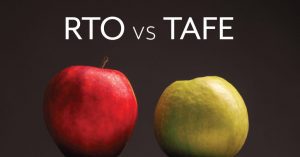Differences between RTOs vs TAFE
Across Australia, Certificates and Diplomas are studies by learners at a number of Vocational Education and Training (VET) institutions. While exploring your study options in aged care, you have probably come across VET institutions like TAFE (Technical and Further Education) and RTOs (Registered Training Organisations).
VET courses offering a range of qualifications in many industries are provided via both TAFEs and RTOs. To help you choose the provider that will best meet your study needs, it is important to understand their key differences.

Vocational Education and Training for practical skills
For those wanting to pursue a career in aged care, VET is a wise choice. Its practical nature and focus on both knowledge and skills makes it a popular way to train or upskill. In 2019, 4.2 million students were enrolled in either a certificate, a diploma or an advanced diploma course according to the most recent figures from NCVER. VET can also provide pathways to higher studies, such as university.
Whether you are venturing into studies as a mature aged student, or you’re a school leaver, VET is equally suitable. Data from NCVER indicates that the estimated participation rate of VET students in Australia as a proportion of the Australian population aged 15 to 64 years was 24.1%.
What is an RTO (Registered Training Organisation)?
A Registered Training Organisation (RTO) is a provider of nationally-accredited courses. An RTO can be government-run (TAFE) or privately-run — that’s us here at Royal College.
Understanding privately-run RTOs
When a training organisation is owned and operated by a company it is a privately-run RTO. These Registered Training Organisations often specialise in a particularly sector. For example, at Royal College of Healthcare we specialise in providing training for the aged care sector. Other privately-run RTOs may focus on training for early childhood education, hospitality or business, just to name a few.
By specialising in specific sectors, privately-run RTOs often employ teams of trainers who are experts in their respective fields. They often have years of experience working in the sector themselves and truly care about the industry within which they train. This firsthand experience ensures they can offer learners with guidance throughout their training journey plus hands-on experience with practical placement and developing strong relationships with sector.
Getting to know TAFE
If you haven’t heard of Technical and Further Education before, it’s probably because it is more commonly shortened to and known as TAFE. TAFEs are financed, owned and operated by the Australian government. Traditionally TAFE courses are said to place an emphasis on occupational skills when compared to university. They tend to cover a wide variety of professions and trades. Similar to private RTOs, TAFE’s certificate and diploma courses are nationally accredited and focus on practical training.
TAFE courses are an option for learners looking for a broad certification, though class sizes tend to be larger. They also tend to specialise in classroom delivery rather than online.
Must-know differences between RTOs and TAFE
Whether you’re looking at TAFE courses or courses delivered via private RTOs, the quality can vary from each institution. Each VET training provider should be assessed on a case by case basis depending on what you are seeking from your training provider.
There are also a number of key differences between TAFEs and privately-run RTOs that should be considered, including some of the following:
Funding options and course costs
Course costs can vary depending on each individuals’ circumstances and funding eligibility. While TAFE and some private RTOs, receive government funding for courses, Registered Training Organisations tend to have more options for learners to access funding support such as interest-free payment plans.
Course delivery and flexibility
While TAFE courses have set class dates and requirements including a campus to attend classes, privately-run RTOs are likely to give you access to more flexible study options. This could include individualised pacing of your learning or workplace training, while still receiving support from a dedicated trainer.
Practical experience
Hands-on learning is vital in most VET courses, and so you will find that TAFE and private RTOs both offer this. As a result of strong sector ties through their niche approach to training, Registered Training Organisations can often provide support for learners to access a broader range of practical placement opportunities.
Royal College of Healthcare for aged care training
At the end of the day, choosing a provider should come down to the quality of the training and programs provided, as well as the support you’ll get along the way.
At Royal College of Healthcare we deliver high-quality, specialised training in aged care and we are committed to educating learners to thrive in aged care careers.
Our team comprises compassionate and caring aged care trainers as well as learner success advisors who provide our students with support from start to finish. When you graduate from Royal College, you leave with the knowledge and capabilities required for real world success.
Whichever VET course provider you choose for your aged care qualifications, ensure their offering is aligned with your study preferences, the level of support you need and ultimately your career goals.
For more information about the Royal College approach to VET courses, contact us today.



